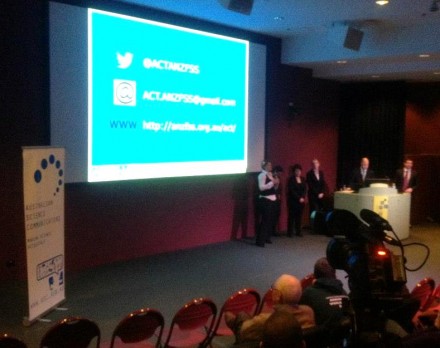By Ian McDonald (Secretary, ASC ACT branch committee)
On a brisk Wednesday evening in early August, Canberrans came to hear real forensic scientists discuss their careers and how they differ from Hollywood’s portrayal. The ASC Canberra event entitled CSI vs Real Forensic Science, was facilitated by Ben Lamont, the Vice President of the ACT Chapter of the Australian and New Zealand Forensic Science Society (ANZFSS) and Forensics Capability Development and Training Officer for the Australian Federal Police (AFP).
This one and a half hour seminar-style event was both interactive and entertaining. Ben set the scene, describing a mock crime and asking five of his AFP colleagues, who specialised in the areas of either: fingerprints, documents, chemical criminalistics, biology and firearms to run through how they would approach the scene and some of the issues they might be face with collecting evidence, particularly for outdoor crime scenes or attending multiple sites.
The audience of over 100 attendees, including ASC members, high school and university students and members of the science community and general public, packed the CSIRO Discovery Lecture Theatre and asked lots of thought-provoking questions.
So, can a crime really be solved within the time frame of an hour TV show? Definitely not according to our expert forensic scientists who talked about it taking up to weeks or months for certain types of evidentiary samples to be processed, analysed and then used as evidence in court. One question of particular interest to our audience was whether Australia is allowed access to the USA fingerprint database used to collect fingerprints from all travellers entering the USA. According to Melanie our fingerprint expert, Australia definitely does not have access to any of the USA databases. The question was asked a few times… it did make me wonder what our audience members were trying to hide!
So how was science communication linked in with this event? Well, forensic scientists probably have one of the most difficult and high pressure communication jobs in the world sometimes being summoned to court and having to give on-the-spot expert evidence in front of lawyers, jurors and judges. I personally couldn’t think of anything more nerve-racking. Also, like many science jobs out their, the speakers did talk about the difficulty of getting into this very popular industry, where in some cases, only 1 of every 30 forensic science graduates are able to get a job in Australia.
So we were very lucky to spend time with these scientists, considered the ‘rock stars’ of the science world, learning about the industry and how it differs from those exciting TV shows we can watch on a nightly basis.
The audience was thoroughly impressed with the professionalism and organisation of the event. The ACT branch committee was very happy with the support we drummed up for both science in general and for the Australian Science Communicators. For those of you who listen to Triple J’s “The Hack” program which airs nationally every afternoon at 5:30pm, this event will be featured on the program in the coming weeks.
The event would have not been possible without our co-organisers and sponsors, Inspiring Australia, CSIRO Discovery and of course, the ANZFSS. We look forward to continued collaboration in future events.
The Forensic Experts answering audience questions at the end of seminar. Speakers left to right: Melanie Fraser (Fingerprints), Alex Borg Caruana (Firearms), Rochelle Epple (Documents), Felicity Pagan (Biology), Ben Lamont (Facilitator) and Timothy Simpson (Chemical Criminalistics).

